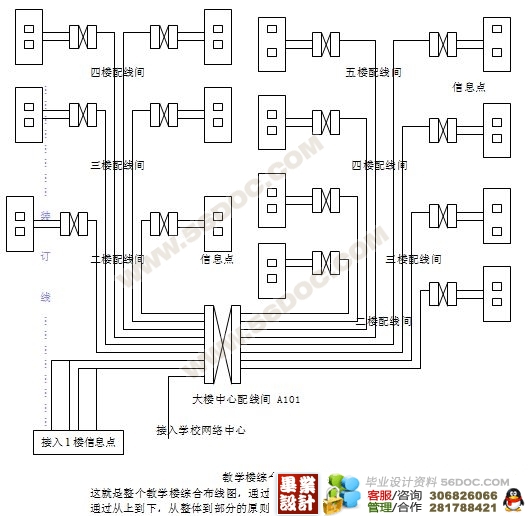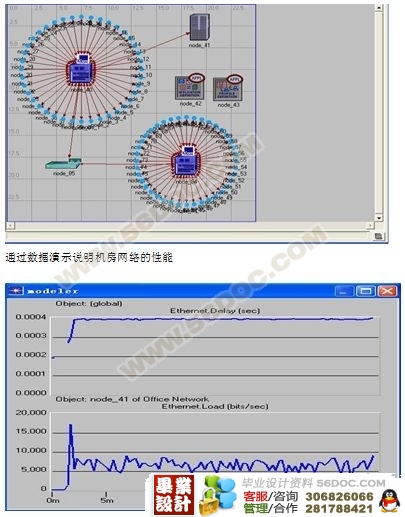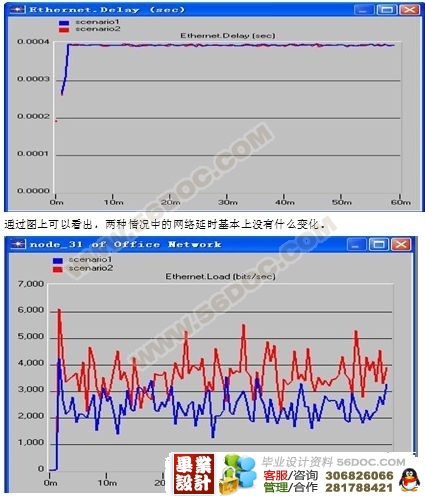摘 要
现代学校的硬件建设离不开计算机网络的架设,随着社会的发展,招生人数的日益增长,网络硬件处理信息的能力正在不断地经受着考验,尤其是当大量的信息同时在网络上传播,给网络带来不小的负担;同时,网络安全也是一个不得不考虑的问题,校园内重要部门(比如财务部)的机器不应该被随便访问;网络信息交换效率也是信息时代网络评价的重要指标。降低网络的冗余,提高网络传输速度,使网络简单化,节约化是网络设计的主要目的。
综合布线系统是一项实践性很强的工程。它是现代社会信息化的必然产物,是多功能、智能型大楼的必然要求。综合布线系统对基于各种系统资源的大楼总体功能的发挥并保持各部门长期、高效率的运转发挥着重要的作用。
所谓系统集成,就是通过计算机网络技术,将各个分离的设备(如个人电脑)、功能和信息等集成到相互关联的、统一和协调的系统之中,使资源达 到充分共享,实现集中、高效、便利的管理。
针对宿舍网用户的具体特点,以组建与规划两个大方面具体分析章丘校区宿舍网络的建设。通过软件与硬件配置分析宿舍网络的建设,并对各部分设计进行了详尽的分析,最终达成了一个完整的设计方案。(所有权: 毕业设计网 )
关键词: 综合布线 系统集成 路由配置 局域网
ABSTRACT
The modern school building can not be separated from the hardware to set up computer networks, along with the development of society, the growing enrollment, network hardware's ability to deal with information are constantly being subjected to a test, especially when a large number of information dissemination on the network simultaneously, networks give no small burden; at the same time, network security is also a have to consider the issue of major departments on campus (such as the Finance Department) of the machines should not be casually visits; network efficiency of information exchange network evaluation of the information age is also an important indicator of . Reduce network redundancy, improve network speed, network simplification, saving is the main purpose of network design.
Integrated wiring system is a highly practical project. It is a modern information society and the inevitable product of multi-functional, intelligent building, an inevitable requirement. Integrated wiring system to a variety of system resources based on the overall function of building and maintaining various departments long-term, highly efficient operation plays an important role.
The so-called system integration, computer network technology is through the various separation equipment (such as personal computers), functions and information such as integrated into interrelated, unified and coordinated systems to make sure resources are fully shared, centralized, efficient to facilitate management.
In this paper, the main dormitory for the specific characteristics of Net users to set up and planning the two major aspects of a specific analysis Zhangqiu campus network. Through the analysis of software and hardware configuration of the building houses the network, and various parts of the design of a detailed analysis finally reached a complete design. In this paper, the main dormitory for the specific characteristics of Net users to set up and planning the two major aspects of a specific analysis Zhangqiu campus network. Through the analysis of software and hardware configuration of the building houses the network, and various parts of the design of a detailed analysis finally reached a complete design.
Key Words:Integrated Wiring System Management Residence Network Router Config
一所以教师教育为办学特色的省属成人本科师范院校,由两个校区组成,为满足学校建设与发展的需要,加强校内各部门之间的信息交流与合作,增进对外联系,更好的为教学科研服务,小组进行分工合作。
目前,学院设有13个分院、系,1个网络中心及20多个行政管理部门,分布于全校的教学行政区内。按照地理分布并考虑将来的发展,可将其分为济南和章丘两个分区,章丘校区以网络中心为中心,管理范围包括章丘校区教学楼、图书馆、实验楼各行政管理部门等单位。济南校区以实验楼为中心,管理区域包括实验楼、济南校区各教学楼、教工及学生宿舍楼等单位。
学校搬迁到章丘新校区以后,目前有实验楼、教学楼、在建的图书馆大楼及体育馆大楼需要与网络中心连接成校园网络,并且各层分别需要网络布线,随着科技的不断发展,学校对网络性能的要求越来越高,教学楼是学校主要教学场所,教学楼综合布线的好坏直接影响到学校的教学质量,所以教学楼的综合布线显得尤其重要。
计范围
由于整个学校面积太大,小组成员无法整体进行规划,最后讨论决定以学校教学楼的部分楼层为模板,进行设计。
教学楼分南北两区,每区又分为东西两个子区,东区楼层为四层,西区为五层。各楼层分别要进行综合布线,通过A区1楼层A101设备管理间的汇聚层交换机与学校网络中心相连接。
(2)设计目标的确定
应当符合当前和长远的信息传输要求。网络的信息传输为100Mbps,楼内主干网络传输达到1000Mbps。布线系统的信息出口采用RJ-45插座。
布线系统要立足开放的原则。
(3)布线要求
学校中心机房通过光缆与各个楼层相连,与中心机房相距300M的建筑物采用单模室外光缆,不超过300M的建筑采用多模室外光缆。在各建筑物内部采用超五类分屏蔽电缆链接到设备间配线架上。
(4)系统组成
教学楼的综合布线系统分为设备间系统,垂直子系统以及工作区子系统。
(5)器件选择
工作区选择原则:全部选用超5类系列信息模块、性能全部超过国际标准ISO/IEC11801的标准。
水平子系统选择原则:超5类UTP线缆完全满足网络信息100Mbps传输性能。配合连接硬件产品可以支持多媒体、语音、数据和图形图像等应用。所有产品满足ANSI/TIA/EIA-568A ISO/IEX11801等标准。
主干线缆选择原则:拟选用6 芯多模(或者单模),可以支持千兆以太网主干。体现了经济实用的原则,同时满足未来高带宽需求的应用。
配线架选择原则:考虑到今后校园网络的发展,保证连接端口的扩充性以及先进性。配线架具有独特的电抗平衡性。可确保5类线缆的传输性能。(所有权: 毕业设计网 )



目 录
摘 要 ……………………………………………………….5
ABSTRACT ……………………………………………………6
第一章 绪论 ………………………………………………..7
1.1 研究背景及意义 ……………………………………..9
第二章 综合布线 ……………………………………………10
2.1 简介 …………………………………………………..10
2.2 需求分析 ……………………………………………10
2.3 网络的总体设计 ……………………………………13
2.3.1 网络类型 …………………………………………..14
2.3.2 系统布线结构 ……………………………………15
2.3.3 网络拓扑结构 …………………………………..15
2.3.4 网络布线的目标 …………………………………15
2.3.5 综合布线设计范围及要求… ……………………..15
2.4 综合布线的具体设计思路………………………….16
(所有权: 毕业设计网 )
2.4.1 综合布线系统图设计 ……………………………..17
2.4.2 具体系统设计……………………………………….17
2.5 网络性能仿真……………………………………….17
第三章 路由器及交换机的配置 …………………………19
3.1 简介 …………………………………………….19
3.1.1 现行研究存在的问题及解决的办法……………..19
3.1.2 研究目的及其内容 ……………………………….20
3.2 可行性的研究分析……………………………….. 20
3.2.1 设计要求…………………………………………… 21
3.2.2 设计目标 …………………………………………..22
3.2.3 设计的软硬件环境 …………………………………23
3.2.4 设计存在的主要问题………………………………..24
3.2.5 小结 …………………………………………………..24
3.3 Cisco路由27交换机主要应用技术………………….25
3.3.1交换机 ………………………………………………26
3.3.1.1 交换机的基本功能……………………………….26
3.3.2 交换机的术语解释 …………………………….27
3.3.2 路由器
3.3.2.1 路由器的基本功能 ……………………………….28
3.3.2.2 路由器术语解释
3.3.2.3 Cisco系列路由器、交换机基本命令及设备状态.. 29
3.4 网络具体配置 ……………………………………...29
3.4.1 校园网拓扑图 ……………………………………….29
3.4.2 配置VLAN……………………………………………… 30
3.4.3 交换机端口安全 ………………………………………..31
3.4.4 生成树协议(STP) …………………………………….32
3.4.5 路由协议 …………………………………………………32
(所有权: 毕业设计网 )
3.4.6访问控制列表(ACL)……………………………………..32
3.4.7 NAT ……………………………………………………..32
第四章 系统集成 ……………………………………………..32
4.1项目背景及需求分析 ………………………………………..33
4.1.1 学院简介 …………………………………………………….33
4.1.2 需求分析 …………………………………………………….34
4.1.2.1 账户管理 ………………………………………………..35
4.1.2.2 文件管理 ………………………………………………..38
4.1.2.3 打印机管理 …………………………………………….39
4.1.2.4 访问Internet …………………………………………….40
4.2 项目规划 …………………………………………………….40
4.2.1 ip地址规划 ………………………………………………..41
4.2.2 域规划 …………………………………………………….41
4.2.3 规划用户账户和组 …………………………………………41
4.2.4 规划文件服务器 …………………………………………….42
4.2.5 规划打印系统 …………………………………………….42
4.2.6 规划上网方式 …………………………………………….42
4.3 具体实施 …………………………………………………….43
4.3.1 安装操作系统 …………………………………………….43
4.3.2 创建windows域 …………………………………………….43
4.3.3 根据部门划分OU …………………………………………….43
4.3.4 创建用户账户和组 …………………………………………44
4.3.5 配置安全策略 …………………………………………….44
4.3.6 配置文件服务器 …………………………………………….44
4.3.7 配置打印服务器 …………………………………………….44
4.3.8 配置***** ……………………………………………..44
第五章 局域网技术 ………………………………………………….44
5.1 引言 ………………………………………………………….45
5.2 组网原理及规划方案 …………………………………………46
5.3 通讯协议 ………………………………………………………47
5.4 硬件准备成本核算 ……………………………………………47
5.5 宿舍网的组建 ……………………………………………..48
5.6 宿舍网带来的好处 ………………………………………….49
参考文献……………………………………………………………… 52
附 录 ……………………………………………………………..53 |



